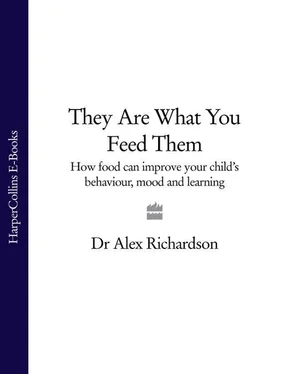Results from the most recent official survey of the nutritional status of children in the UK, carried out in 1997 and published in 2000, are not even freely available on the Internet (like the results from the adult survey are), despite this research having been funded by UK taxpayers’ money. Perhaps the Government would rather we didn’t know? Later in the book, you’ll read about some of these findings, and I hope you will agree that they really don’t give us any cause for complacency.
We keep being told that ‘a well-balanced diet can provide all the nutrients you need’. That may be true, but the truth is that many children’s diets are a very long way from being well-balanced…and the effects of this malnutrition on their behaviour and learning can be devastating. What I see going on in almost every sphere is a mixture of ignorance and a quite extraordinary denial of how food and diet can influence our brains and our behaviour.
They Are What You Feed Them
In recent years public concern has finally been mounting about the unhealthy nature of many children’s diets, but it took Jamie Oliver’s dramatic exposé about school dinners to put the shocking issues right in front of us. The British Medical Association, not usually known for its radical stance, has since joined in and demanded that something be done about children’s nutrition.
The evidence is now undeniable that poor nutrition is putting children’s physical health at risk. Many children are now expected to die before their parents—as a direct result of their unhealthy diets and lifestyles.
The epidemic of overweight and obesity in children is the most obvious sign that all is not well, and has become rather difficult to ignore. For years, the food industry and its supporters have always got away with blaming the expanding waistlines of our children purely on lack of exercise—but as anyone with half a brain can see, poor diets are equally, if not more, to blame.
The physical health problems that accompany, and in most cases precede, such unhealthy weight gain are not usually so obvious to the naked eye. The underlying problems that are leading to Type II diabetes (in which the body stops responding normally to insulin), even in children, often go unnoticed until this has already caused major health problems. Type II diabetes used to be a rare disease that occurred mainly in old age. If you follow the advice given in this book, however, I can almost guarantee that your child will not fall victim to this ‘silent killer’.
The effects of food on behaviour are also invisible, but very real. The brain is part of the body, and it relies on the same food supply to meet its needs. However, despite this obvious fact, almost no attention has been focused on the importance of nutrition for children’s behaviour and learning.
Many children’s diets are high in sugar, refined starches and the wrong kinds of fats, as well as artificial additives. They are high in calories (energy), but lacking in essential nutrients. The risks to physical health of such a ‘junk food’ diet are now recognized, but their potential effects on children’s behaviour, learning and mood are still largely ignored. The (very limited) research that actually exists into human requirements for different nutrients has never even taken brains and behaviour into account.
Spending on Behaviour Doesn’t Include Diet
In the UK, the Government has recently been forced to spend an additional £342 million on school behaviour-improvement programmes, and the World Health Organization predicts a 50 per cent rise in child mental disorders by 2020. 3
The brain, like the body, needs the right nutrients to function properly.
But scientific research aimed at finding out the extent to which better nutrition could improve children’s behaviour and learning is not something that anyone seems prepared to fund—so our ignorance continues.
Nonetheless, as this book will reveal, there is in fact already evidence to show that for many children (and adults) the improvements in behaviour, learning and mood that can follow from some remarkably simple changes in diet can be quite dramatic. The problem is that too many people don’t even know about this research. Instead, far too many parents who actually suspect that food may be part of their child’s problem—and have good evidence of their own to support this—are often told dismissively by the supposed experts, ‘Oh, there’s no evidence that diet can make a difference.’
This is simply untrue. There is quite a lot of evidence, and much of it is first-class…but it tends to be in different places, and is rarely pulled together. If you add it all up, the case for doing something to improve the diets of children in the UK (and other countries) is now overwhelming.
This book will tell you how to go about improving your child’s diet, with particular emphasis on the impact this can have on mood, behaviour and learning.
In my view, it’s actually verging on negligence for any professional to deny to parents that food and diet can affect their children’s behaviour—although of course there will always be other factors to consider, and dietary approaches should always be complementary to other proven management methods. However, I can’t really blame individual professionals for reflecting the training that they’ve been given and the culture in which they live and work.
We Need to Change Our Legacy
The real problem is that we’re dealing with a legacy of ignorance and complacency about nutrition that has now gone on for many decades. In relatively rich, developed countries like the UK, it’s simply been assumed that no one is really likely to be at risk of malnutrition. Rising rates of obesity are taken as evidence to confirm this—but of course there is a big difference between being overfed and being well nourished. What too few people seem to recognize and acknowledge is that our diets—and particularly children’s diets—have changed out of all recognition during the past few decades. To make matters worse, the education that any of us receives about how our brains and bodies work, and what nutrients we need not just to stay healthy, but to allow our minds and brains to function properly (let alone at their best), is extremely limited.
School syllabuses do cover diet, but there is little time to teach children what they really need to know. What’s more, healthy eating messages can easily be subverted by the heavy advertising of ‘junk foods’ and peer pressure that our children face. Generally speaking, most adult education in this area is limited to information in the media. Sadly, most of this actually comes from the food, supplement and diet industries, and is often little more than marketing and advertising for their latest products and services. This doesn’t help anyone to make properly informed choices.
Over the years, many parents have asked me where they can get information that they can really trust on the food and diet issues that most concern them as they try to do the best they can for their children. When you’ve read this book, if you’d like more information about the scientific research in this area that is independent of commercial influences, and any further details on some of the information provided here, you can find it on the website of the charity Food and Behaviour Research (see www.fabresearch.org).
I’m not going to pretend that we have all the answers, because we don’t. There’s still a huge amount that we don’t know about how nutrition can affect mental health and performance. Many of the answers to key questions would not actually be hard to find if there were a will to investigate. If this kind of research received just a tiny fraction of the resources that go into pharmaceutical and other approaches that have so far failed to deliver, we would have much of the evidence we need. This is why I’ve dedicated the entire proceeds of this book (which would otherwise go to me, the author) to the Food and Behaviour (FAB) Research charity.
Читать дальше












